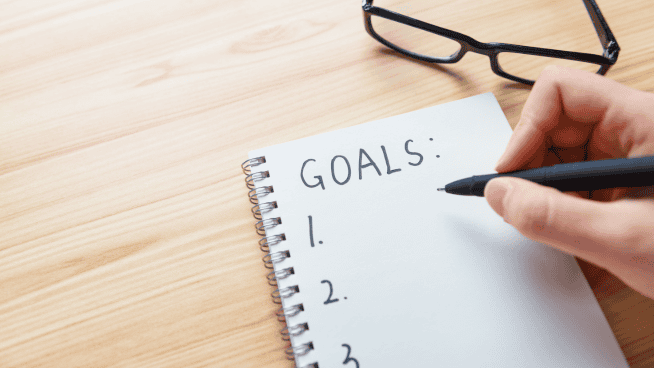Journaling for Mental Health
When you were a teenager, you might have kept a diary at your bedside to record your thoughts. Something personal that allowed you to delve deep into your emotions at the time. Perhaps unknowingly, your diary helped you process feelings of anxiety, depression, and stress. It helped paint a clearer picture of the world and your place in it.
Fast forward to adulthood: writing in your diary isn’t quite the same. Now it’s called journaling. And it will still hold the emotional significance that it did when you were younger. However, you might replace the thoughts about your grade school crush with musings on your athletic endeavors, but who am I to judge.
In recent memory, mental health has become a focal point for athletes. That’s not to say it has never existed. The spotlight has grown. The spread of information across social media has amplified feelings of loneliness and despair. We’re seeing more professional athletes speak out about their mental health. Kevin Love, Simone Biles, and Michael Phelps have publicly addressed their struggles. Like any job, athletes work in high-pressure environments with significant expectations.
They’re human. We’re all human. And we have a cacophony of emotions vying for our attention. Enter a journaling practice. Now I won’t say this is a cure-all for mental health. It’s merely an option to consolidate your thinking: a place to bring your thoughts when your brain is tired of the heavy-lifting.
Journaling Benefits
The benefits of journaling for mental health are endless. If you are hesitant, there’s no right way to journal. Hopefully, this will eliminate any unnecessary barriers. Just get started.
· To develop self-reflection and introspection
· To clarify thoughts and emotions
· To ruminate and organize decisions
· To relieve anxiety and stress
· To generate ideas
· To track habits and behaviors
How to Start a Journal Entry
The most daunting part of journaling is the beginning. Confronted with a blank page and endless thoughts racing through your head is a tall order. Once you get writing, though, the words will start flowing.
Here are some practical tips to get you started
Tip #1: Have a Goal in Mind
Your writing should focus on a result. Ask yourself, “what am I trying to get out of this?”. It could be to rid your mind of negative emotions. Or to reflect on your experiences for the day. Whatever you want. Set that intention before you begin: it will give structure to your words.
Tip #2: Date Your Entries
Write the date (and the time) at the top of the page. Journaling is a medium to showcase your development and maturity. You want to be able to look back through your entries to rehash old ideas and habits and compare them to your current way of thinking.
Tip #3: Pick a Time and Place
Create a ritual around your journaling practice. You can do it in the morning to “set the tone” for the day. You can journal at night, before bed, to review the day’s events. If you can create a habit around it, you’re more likely to stick to it long-term.
Tip #4: Use The Right Tool
Pick a tool and stick with it. I strongly suggest the classic pen and notebook. There is something more meaningful about putting words down on paper. You can use your tablet or some other means, too. Something physical with the storage for multiple entries will suffice.
Tip #5: Write Every Day
Lean into your journaling like it’s your private reflection ceremony. Make it unique to your goals and preferences. Writing a little something each day will yield the benefits of compound interest and set you on a course for self-mastery.
Journaling Prompts
A. Dealing with Emotions
Empty your Mind – Unload your thoughts from the day. Reflect on your trials, triumphs, and everything in between. Answer questions like What is worrying me? Or What went well today?
Stream of Consciousness – Write whatever is on your mind. This journaling method is more informal compared to the emptying approach. Write without structure. Don’t worry about grammar and punctuation. You’ll quickly reveal a theme to your writing.
Experiences – Reflect on your experiences from the day. You can deliberate on your thought processes, reactions to situations, or general thinking.
B. Self-Improvement
Track Habits/Goals – Write down your goals as a sure-fire way to remember them. Then build the habits through repetition. Keep track of this over time (months to a year) and adjust your actions to achieve your desired outcome.
Reflect on Occurrences – Think about everything you did during the day. Where did you go? What conversations did you have? Why did you react the way you did? There is a lot of power in revisiting these situations. You can think about what you’d do differently next time or recall specific conversations that were meaningful to you.
C. Gratitude
This one is self-explanatory. Gratitude is a valuable form of expression. It will give you a deeper appreciation of the people and things that influence your life. Ask yourself what you are grateful for and ponder on those thoughts meticulously. Perhaps this will help you clarify your problems and illuminate the role that you serve.
RECOMMENDED FOR YOU
MOST POPULAR
Journaling for Mental Health
When you were a teenager, you might have kept a diary at your bedside to record your thoughts. Something personal that allowed you to delve deep into your emotions at the time. Perhaps unknowingly, your diary helped you process feelings of anxiety, depression, and stress. It helped paint a clearer picture of the world and your place in it.
Fast forward to adulthood: writing in your diary isn’t quite the same. Now it’s called journaling. And it will still hold the emotional significance that it did when you were younger. However, you might replace the thoughts about your grade school crush with musings on your athletic endeavors, but who am I to judge.
In recent memory, mental health has become a focal point for athletes. That’s not to say it has never existed. The spotlight has grown. The spread of information across social media has amplified feelings of loneliness and despair. We’re seeing more professional athletes speak out about their mental health. Kevin Love, Simone Biles, and Michael Phelps have publicly addressed their struggles. Like any job, athletes work in high-pressure environments with significant expectations.
They’re human. We’re all human. And we have a cacophony of emotions vying for our attention. Enter a journaling practice. Now I won’t say this is a cure-all for mental health. It’s merely an option to consolidate your thinking: a place to bring your thoughts when your brain is tired of the heavy-lifting.
Journaling Benefits
The benefits of journaling for mental health are endless. If you are hesitant, there’s no right way to journal. Hopefully, this will eliminate any unnecessary barriers. Just get started.
· To develop self-reflection and introspection
· To clarify thoughts and emotions
· To ruminate and organize decisions
· To relieve anxiety and stress
· To generate ideas
· To track habits and behaviors
How to Start a Journal Entry
The most daunting part of journaling is the beginning. Confronted with a blank page and endless thoughts racing through your head is a tall order. Once you get writing, though, the words will start flowing.
Here are some practical tips to get you started
Tip #1: Have a Goal in Mind
Your writing should focus on a result. Ask yourself, “what am I trying to get out of this?”. It could be to rid your mind of negative emotions. Or to reflect on your experiences for the day. Whatever you want. Set that intention before you begin: it will give structure to your words.
Tip #2: Date Your Entries
Write the date (and the time) at the top of the page. Journaling is a medium to showcase your development and maturity. You want to be able to look back through your entries to rehash old ideas and habits and compare them to your current way of thinking.
Tip #3: Pick a Time and Place
Create a ritual around your journaling practice. You can do it in the morning to “set the tone” for the day. You can journal at night, before bed, to review the day’s events. If you can create a habit around it, you’re more likely to stick to it long-term.
Tip #4: Use The Right Tool
Pick a tool and stick with it. I strongly suggest the classic pen and notebook. There is something more meaningful about putting words down on paper. You can use your tablet or some other means, too. Something physical with the storage for multiple entries will suffice.
Tip #5: Write Every Day
Lean into your journaling like it’s your private reflection ceremony. Make it unique to your goals and preferences. Writing a little something each day will yield the benefits of compound interest and set you on a course for self-mastery.
Journaling Prompts
A. Dealing with Emotions
Empty your Mind – Unload your thoughts from the day. Reflect on your trials, triumphs, and everything in between. Answer questions like What is worrying me? Or What went well today?
Stream of Consciousness – Write whatever is on your mind. This journaling method is more informal compared to the emptying approach. Write without structure. Don’t worry about grammar and punctuation. You’ll quickly reveal a theme to your writing.
Experiences – Reflect on your experiences from the day. You can deliberate on your thought processes, reactions to situations, or general thinking.
B. Self-Improvement
Track Habits/Goals – Write down your goals as a sure-fire way to remember them. Then build the habits through repetition. Keep track of this over time (months to a year) and adjust your actions to achieve your desired outcome.
Reflect on Occurrences – Think about everything you did during the day. Where did you go? What conversations did you have? Why did you react the way you did? There is a lot of power in revisiting these situations. You can think about what you’d do differently next time or recall specific conversations that were meaningful to you.
C. Gratitude
This one is self-explanatory. Gratitude is a valuable form of expression. It will give you a deeper appreciation of the people and things that influence your life. Ask yourself what you are grateful for and ponder on those thoughts meticulously. Perhaps this will help you clarify your problems and illuminate the role that you serve.











